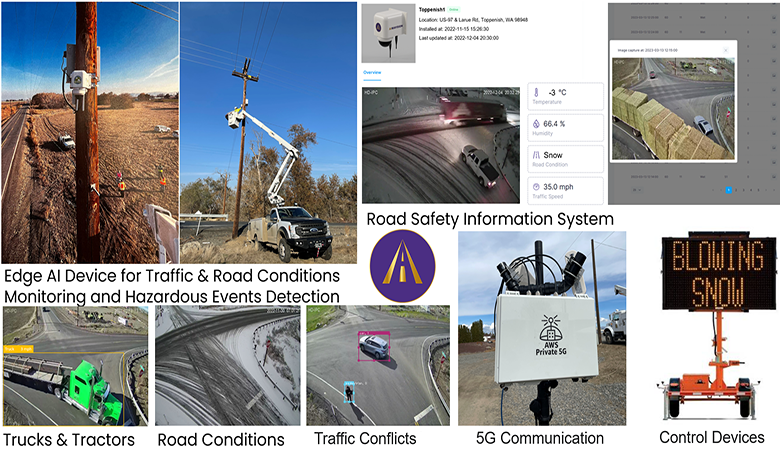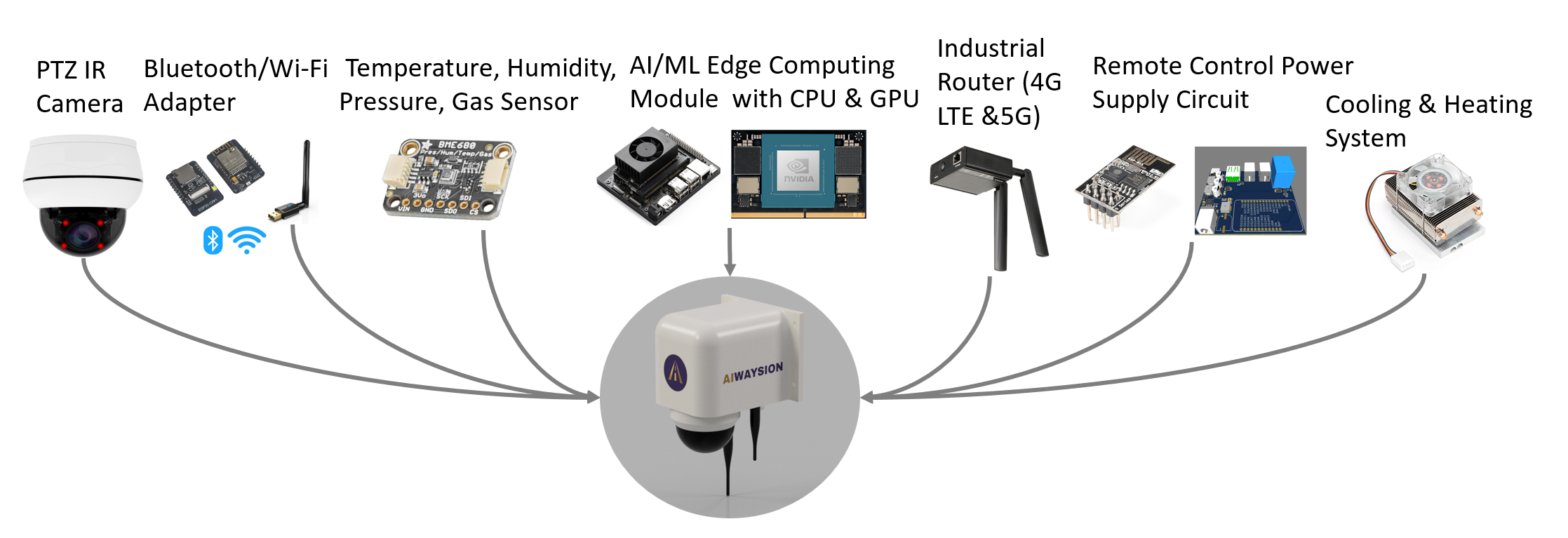Leveraging AI-Powered Technology to Gather Traffic Safety Data
In the face of high road deaths, Yakama Nation partners with SBIR recipient AIWaysion to save lives in national SMART grant

THE CHALLENGE
Funding Agency: FHWA
Small business: AIWaysion Inc. https://www.aiwaysion.com/
Project: Edge Server-Based AI Application for Dilemma Zone and Traffic Conflict Events Detection
Principal Investigator: Wei Sun, PhD
Location: Seattle, WA
Since 2021, dozens of residents have been killed and hundreds of others have been seriously injured on the stretch of US-97 running through the Yakama Indian Reservation in Washington State. Traffic safety is an urgent concern for the Confederated Tribes and Bands of the Yakama Nation: in Washington state, rural communities experience twice as many traffic fatalities per vehicle mile traveled as urban areas. The disparity is even higher for Native Americans in Washington, who experience nearly four times the traffic fatality rate as non-native Americans. And amongst all Native American communities in Washington State, the Yakama Nation has both the highest rates of pedestrian and vehicle fatalities.
The infrastructural challenges in Yakama territory are many. Roads are often in need of continued maintenance, roadways frequently experience challenging weather conditions from fog to ice, and most of these rural roads lack pedestrian and bike facilities or adequate lighting. This means that pedestrians are forced to share unlit roads at night with vehicles on curvy, steep roads with narrow shoulders, creating an extremely dangerous mix for vulnerable road users and drivers alike.
AIWaysion, a small business that focuses on using AI to provide smart mobility solutions, has worked with the Yakama Nation through a series of Phase I and Phase II SBIR awards funded by the U.S. DOT’s Federal Highway Administration to develop new technology to collect and analyze traffic and road data to help the tribe address these serious road safety problems. Now, the Yakama Nation has partnered with AIWaysion to apply for and be selected to receive a highly competitive U.S. DOT Strengthening Mobility and Revolutionizing Transportation (SMART) grant to expand their deployment of this technology developed under SBIR.
THE TECHNOLOGY
Gathering basic traffic safety data is essential to be able to begin addressing the disproportionate burden of traffic deaths and injuries in communities like the Yakama Nation, but as a rural community, this federally recognized tribal nation faces major challenges in collecting and using traffic data. In many rural areas, broadband access is still limited. This means that connecting, transferring, and processing large amounts of data via the internet isn’t a realistic option for analyzing road conditions in real time. Some urban communities are starting to take advantage of state-of-the art technologies like artificial intelligence (AI)-powered tools that use machine vision and other sensors to monitor traffic and road conditions in real time. But tools dependent on high-speed internet remain out of reach for many rural communities.

This is where edge computing comes in. It is an emerging technology that allows smart devices to function independently of a broader network. Large, detailed data sources like video images can be processed and interpreted locally on the device, rather than needing to be sent off via highspeed internet to a centralized data processing center, as happens in standard AI systems. Then, the already-processed results can be transmitted to users via cellular networks. Edge computing puts state-of-the-art traffic analysis tools within reach of rural communities without broadband like the Yakama Nation.
AIWaysion has been developing an edge computing traffic sensor and analysis device with funding from the U.S. DOT SBIR program. AIWaysion first received a Phase I SBIR award funded by FHWA to develop smart sensors that can detect “dilemma zone” and traffic conflict events using edge computing. This research has continued to develop through a Phase II SBIR award and has been tested and installed in the Yakama Nation and several other communities. AIWaysion also received a second Phase I SBIR award, also funded by FHWA, to develop a sensor fusion device that can detect and analyze in real time a wide variety of traffic and road condition data, such as vehicle classifications and speeds as well as weather-related road surface conditions like snow or ice. “Both types of data are desperately needed, especially in rural areas like Yakama nation,” said AIWaysion CEO Dr. Wei Sun. The technology also can communicate in real time with infrastructure such as traffic control devices and variable message signs to provide lifesaving safety alerts. “Facts are important — we are utilizing the data to tell us what the reality is that we are facing,” HollyAnna Littlebull , the former Traffic Safety Coordinator of the Yakama Nation, told the University of Washington. “So far, [AIWaysion’s device] is the best tool that we’ve ever had to give us current and up-to-date information. We want to make the best decisions possible to reduce fatalities and serious injuries.”
SBIR’S ROLE
AIWaysion, co-founded by Dr. Yinhai Wang and Dr. Wei Sun, grew out of the Smart Transportation Applications & Research (STAR) Lab at University of Washington (UW). The team had developed and tested the edge computing unit with innovative artificial intelligence algorithms in the lab but had limited resources to scale and commercialize the product. SBIR funding helped AIWaysion leverage their existing algorithms and improve the hardware system that would be able to be used in a rural context like the Yakama Nation, as well as to hire staff and develop their spin-off company. “Certainly, funding wise, SBIR is huge to us,” said Sun. Particularly in their work with the Yakama Nation, Sun said, SBIR award funding was critical because the rural community did not have the sensors and hardware infrastructure that large urban communities already have in place. In a recognition of the technology’s transformative potential, AIWaysion’s smart sensor program with the Yakama Nation was awarded a U.S. DOT FHWA Build a Better Mousetrap 2023 Innovative Project Award.
THE FUTURE
Although just a little over two years old, AIWaysion is already beginning to build on the research they developed through their SBIR contracts to field test and deploy the technology on a larger scale. The company, along with research partners at the University of Washington, are now partnering with the Yakama Nation on a competitive national SMART grant that will allow them to expand and deploy the edge computing technology along the entire US-97 corridor in the Yakama Nation. They also plan to collect a broader set of environmental, traffic, and road condition data that is relevant in rural communities, from near miss events to speeding to animal crossings.
Edge computing technology has enormous potential, particularly for rural communities. In the future, edge computing may have the potential to replace expensive traffic signal controller boxes, said FHWA Contracting Officer’s Representative Dr. Wei Zhang. The low-latency technology could also be a critical piece in allowing for vehicle-to-infrastructure technology, allowing traffic signals and other road infrastructure to communicate directly with automated cars and cellular devices.
